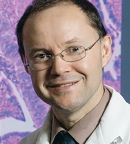Discussant of the CCGA study, David Huntsman, MD, Founder and Chief Medical Officer of Contextual Genomics, said: “Screening is the peak [for the number of people who could benefit from early detection], but screening is the most challenging. It requires high sensitivity and specificity that is close to perfect.”

David Huntsman, MD
The challenges of developing a blood test include low mutational burden in typical blood sample size; some mutations can be found in both cancer and normal tissues; diagnostic odysseys can cause harm; near-perfect specificity is required as a safety issue; and high sensitivity will impact cost-effectiveness.
‘Moving in the Right Direction’
“Both this study and the DETECT-A study show we are moving in the right direction,” said Dr. Huntsman. “However, we still need to demonstrate an improvement in overall survival in a large series before these tests are adopted.”
“Mutation testing alone will not be enough,” Dr. Huntsman continued. “The methylation-based assay presented by Dr. Thiel had excellent specificity, particularly in the group with high clinical suspicion of cancer, where you might expect it would fall down. The sensitivity is low, but that is being worked on. The accuracy in detecting the tissue of origin is intriguing and suggests this test could be used for patients who present with metastases and cancer of unknown origin,” he commented.
“Many questions remain, but it is exciting and courageous to see studies moving forward in this direction,” Dr. Huntsman noted.
DISCLOSURE: Dr. Huntsman is founder and Chief Medical Officer of Contextual Genomics, a bioinformatics company.

